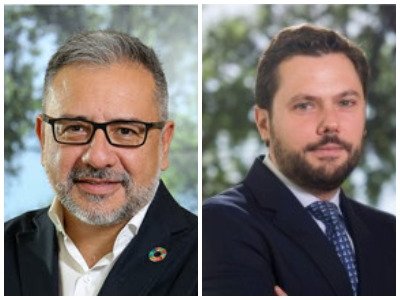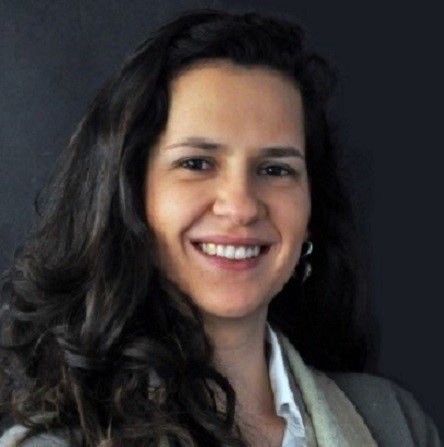Surfing the big wave

They are the link between the partners and the media, but also the ones who keep the team’s flame alive in these days of confinement and smart working. Firms´ in-house Communication managers surf the heavy storm developing an important task as external and internal connectors of all the actors of Business law. We wanted to get closer to some of them, although there are many who are doing their best to make everything work during the COVID-19 crisis. One thing is clear: the true power of internal communication has been the great revelation of this pandemic

How to communicate in times of crisis? These four heads of their respective firm´s Communications department are a good example of the appropriate response. The key, as always, hard work, but also attention to detail and timing and, of course, large doses of empathy. Nobody better than them to take the temperature of the offices and the environment. They are, without a doubt, the best antivirus.
DIGITAL DIMENSION
Although everyone agrees that the use of online channels has become more massive due to the pandemic, this has not been the most notable change, with internal communication being revealed as a priority in this situation. “As in every crisis,” says Paula Arroyo, head of Communications at Dentons, “there is an opportunity to work with ingenuity and seek new forms of collaboration. In our case, the great revolution has been the use of our internal communication channels, which have allowed us to demonstrate the true capacity of the firm to work as a team within different jurisdictions. This has facilitated not only greater internal collaboration but also coordination with the outside world in order to send a single message from the firm to clients with interests in various countries and to the media around the world.”
Miguel Verger, head of Communication at Linklaters explains that although in the case of Linklaters they have not diversified the formats since they have been investing resources in online channels to spread the firm’s messages, he feels “particularly proud of our profile on LinkedIn, which, with less than a year´s life, has more than 3,000 followers. Due to the current situation, we have intensified our online communication.” Carmen Castillo, Communication director at Ceca Magán Abogados, says that “communication formats are practically the same. For example, webinars, which few companies used before, have been promoted and have replaced traditional events or working breakfasts. Likewise, social networks have gained prominence as one of the most important channels in this situation due to their immediacy.”
If used correctly, the forced use of these online channels is, according to Policarpo Aroca, Grant Thornton’s head of Communications, an opportunity. “The expert reference is still very important in our country when selling professional services, but the digital is a first contact and impact window, which allows your interest audiences to take you into account when considering their next advisors or as a loyalty tool for current clients. Having said that, it is true that the pandemic has accelerated a clear sector commitment to digital. It is an ideal time to bet on tools that other sectors were already using effectively, such as Inbound Marketing, content and Marketing Automation.” Aroca explains that, on the other hand, Grant Thornton has focused its internal communication on weekly updates from its CEO, both on the country situation and on the firm´s progress and the impact of the disease on their teams.
TACT, CLOSENESS AND TRANSPARENCY
The difficult situation we are going through requires tact and delicacy to balance the messages that firms send to clients and professionals. Informing without saturating, in a close, transparent and solidarity way, seems to be these corporate Communication experts´ recipe. “The partners are the first to understand the change strategy, where the client and the internal team are placed above personal areas or objectives. Of course, right now the priority is to help with our legal field knowledge and to try to help our clients to survive this crisis. In our case we have adopted a general ‘we all add up’ and ‘how can we help you?’ message,” explains Carmen Castillo.
Aroca points out that “our firm continues to orient its messages around growth, self-improvement, positivism and excellence values. We have always believed that, in exceptional situations, such as the one produced by the coronavirus, there are companies that look beyond and put in place all the management resources that will make it possible to run smoothly, even in adverse times. This is what we did in 2012 with our video “Spanish Crisis from a different point of view”, and this is what we have done these days with different communications in different formats that put companies that are helping with the coronavirus, or heroes like healthcare professionals, security forces and media, in value.”
On the thin line between advertising and ethics in some firm´s strategies at this time, Miguel Verger states that “in terms of advertising, it is interesting to see how ICAM (Madrid Bar) has recently issued a statement on certain firm´s advertising practices on the occasion of the COVID-19 pandemic, recalling that compliance with the Code of Ethics and respect for our rules become essential,” and clarifies that in Linklaters certain values are very clear. “Above all, we are humans. Solidarity must be a priority for every society. In our law firm, we have always encouraged solidarity initiatives, such as our pro bono work, and now more than ever, collaborating in projects to defeat the COVID-19. For example, we participate in initiatives for financing meals for people in need; fundraising so that children can study during confinement; and the organization of the manufacture and distribution of sanitary material for our heroes: the healthcare personnel, an initiative in which one of our partners has been personally involved.”
In the case of Dentons, Paula Arroyo tells us that their Communication strategy, developed together with the partners, has been based on two issues. “Firstly, we wanted to continue with the strategy we already had of staying close to our clients and to the problems each of them is facing in this situation. When a client contacts us, it is because he expects a helping hand to solve a problem. Secondly, we wanted to take advantage of this moment to show our expertise and the technical level of our lawyers. In this sense, we have been careful, maintaining a balance between keeping our clients served and not saturating them. We are generating such a flood of information that we risk achieving the opposite effect.”
FIGHTING UNCERTAINTY WITH INFORMATION
Lawyers are working remotely and must respond to issues of interest, mainly the legal consequences of the government´s royal decrees. This situation not only has caused, as experts say, an information avalanche, but also a greater workload for them both externally and internally. “Our activity is in line with the current situation and, at this moment, with so many royal decrees, our activity is undoubtedly frenetic. But the Communications area must take a step forward at a time when a firm´s speaker is needed more than ever,” says Castillo while Aroca points to the important coordination work that is being done from these departments. “While our partners are producing all the new material, Communication and Marketing area coordinates that all the new alerts, reports and articles reach their various recipients properly, whether they are clients, associations with which we have agreements or journalists. In the first confinement week, we had already launched a specific website to host all the content that was created by the different lines, a website that we are improving and updating daily in response to new royal decrees approved by the government.
“Communicating, both internally and externally, has become a major issue in organizations,” says Paula Arroyo. And adds that “remote teamwork is mainly based on good communication and on each member knowing what to do. At the same time, as a firm, the right messages must be conveyed to the entire staff. I have to say that we have found a team of great professionals, very committed to the firm and who very well understand the general situation we are experiencing.”
“Externally,” continues Arroyo, “communication has become even more important because it is the only way we can be close to our customers, as well as help us gain visibility in the market. In these times of isolation, it is crucial to be seen in some way.”
Everyone agrees that the situation requires a special effort from everyone, but especially, according to Miguel Verger, “in law firms where Marketing, Business Development and Communication fall under the same department, the workload has grown exponentially. This is due to the fact that, in addition to the increase in communication as a result of this situation, there are also the usual tasks that these departments carry out (business development initiatives, proposals, presentations, events, directories, awards, etc.).” It is precisely in this sense that requests for information from journalists and the media are relentless. We asked the in-house experts how they prioritise these demands, bearing in mind that we must also continue to attend, perhaps now more than ever, to customers. “We try to prioritize according to the objectives already set. Having said that, part of our added value is ‘juggling’ to reach everyone (not only fulfilling the different planned tasks, but also those that come up on a daily basis). Client service is obviously the central axis of our work, but we always try to satisfy the external collaboration requests that we receive,” says Miguel.
This same will is also fulfilled in the case of Ceca Magán. “We really give equal priority to all the media,” answers Carmen. “Everyone needs us because today everyone has fewer resources and less time to locate accurate information. We try to offer each media the type of information that is appropriate for their readers and to be available to them 24/7.” Also from Dentons, Paula Arroyo stresses that despite the increased volume of work “we are trying to provide coverage and response to all the queries that come to us and we´ve had no problem attending to all the requests. In our case, the partners have made an extra effort, and we have not missed any opportunity to appear in the media. In this exceptional situation, we have understood that it was time to put our shoulder to the wheel and make an effort to give content and help journalists.”
For Policarpo Aroca, this depends on the maturity degree of the firm´s communication processes. “Communication flow and procedures at Grant Thornton are mature, and the partners know that responding to journalists, whether for corporate firm issues or service lines, is something we cannot neglect. We always respond to requests and assign them to a pool of spokespersons. In fact, we have created a fortnightly email with different current topics, all very relevant to journalists, in which we remind them that the partners of Grant Thornton can help them to introduce an expert point of view in their information. In this sense, the priority is balanced for all our reference stakeholders.”
TEAM BUILDING IN THE DISTANCE
Fostering corporate culture and team feeling “in the distance” is another of the in-house staff´s fundamental missions in this situation of uncertainty. “We try to launch positive messages and from the law firm´s reality to encourage people who miss physical contact,” says Carmen. “We are a team, and all of us at Ceca Magán want to feel like one. For our part, we have reinforced internal communication on a daily basis: newsletters, climate assessment surveys, video, computer graphics, and without losing our #Fridaynonstop and of course our own #estilocela (#cecastyle).” In this regard, Polycarpo says that, on this occasion, they have created the campaign “Together we are stronger” through which they try to be close in the distance. “The professionals send us their photographs and videos encouraging the rest of the teams. Our president also uses this format to address the firm and we have begun to create videos in which we chat with the different lines to see how they are working and how they are facing these days of confinement.”
But having a strong corporate culture is not something that can be achieved overnight. “These things can’t be improvised,” says Paula. “What you see now is the result of a lot of previous work. It’s true that now, more than ever, communication with other departments is becoming very important, especially with management and human resources. Knowing all the messages you want to communicate before sending them is essential.” Something similar to the opinion of Miguel Verger, for whom corporate culture has always been at the heart of Linklaters. “And probably, now more than ever. We’ve launched several initiatives to keep us all connected. For example, we continue to hold virtual department meetings, organizing virtual ‘coffees’ for the departments and also maintaining communication through various online channels, such as WhatsApp, our communication channels such as Yammer, Jabber and Webex, etc.”
INFLUENCERS
In this context, when creating suitable content for posting or sharing, it is important to keep a good track of the most active and agile lawyers and partners in networks. In this sense, in Gran Thorton they have even created a specific digital ambassadors plan, called Amplify. “The brand can multiply its presence in networks by up to 10 times if its professionals are active, especially in LinkedIn. In this plan, we ‘cure’ the most important contents that we produce and propose them to the professionals. It is not a psychology matter since the partners are very aware of the usefulness of digital channels for positioning their line and speciality. It’s more a matter of generating habit and making constant pedagogy in these new tools.” Carmen Castillo, talks about the influencers at Ceca Magán Abogados, “without a doubt, generating engagement among our partners and lawyers is fundamental for them to be speakers of the brand´s generated content from all areas. They are our best communication agency. These days, company managers and professionals need real opinions from legal professionals who give credibility to the news. And of course, we have our own internal influencers for that.”
But their role is not only to encourage partners and lawyers to write about a particular issue but to advise them so that they all convey the same line of the firm’s strategy. “The important thing in certain size organizations is conveying a homogeneous message. That is why our role is not only limited to promoting the activity of our professionals in networks, but also to advising them so that it is uniform and with a clear objective: service to our clients,” says Miguel. “I am lucky to work in a firm where most professionals are aware of the importance of working on our reputation and presence in the media and networks,” adds Paula, who continues “it is important to know each one´s role and expertise and know-how to ask for help to generate more content. Whenever we have asked for support in this sense, the response has been very positive.”
Article by Desiré Vidal
To read the article in full please download issue N.94 here












